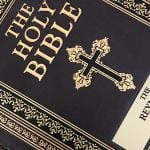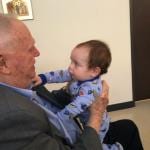![]() Standing in the entrance of Disneyland, I have often seen small children crying when their parents try to take them through the arches that lead into the main part of the park. At first I was puzzled by this strange reaction to the Happiest Place on Earth until it happened with my own children when they were small. My wife and I discovered that the children were heartbroken to leave the most beautiful place (from a child’s perspective) that they had ever been. The entrance to Disneyland has flowers, lights, a train, and music they loved. Why leave?
Standing in the entrance of Disneyland, I have often seen small children crying when their parents try to take them through the arches that lead into the main part of the park. At first I was puzzled by this strange reaction to the Happiest Place on Earth until it happened with my own children when they were small. My wife and I discovered that the children were heartbroken to leave the most beautiful place (from a child’s perspective) that they had ever been. The entrance to Disneyland has flowers, lights, a train, and music they loved. Why leave?
We knew it was better further into the park, but they did not. Of course as parents, we gently tried to help them let go of the one good place in order to go someplace so much better, but often they did not want to go and so the old good became a bad thing keeping them from a better thing. I thought of this when it was pointed out to me that our very religious nation, dominantly Christian, has a very mixed heritage on race issues. Why?
Jesus Christ gave two commands: to love our neighbor and to love God. Racism is a horrifying sin against the command to love our neighbor as self. God creates people in His image, so racism is also blasphemy. It is also stupid since it prevents us from benefiting from the great goods that God would bring through other people.
Why then do so many Christians also struggle with racism?
A few people are wicked just because they wish to be wicked. They may say they are Christians, but they are not. They know racism is wrong, but it is the wrongness that attracts them. These are troubled souls and they need to be opposed. That is the easiest case. What of the rest of us?
Why do seemingly good people struggle with racism or with strongly condemning racism?
A partial answer, based on years of observation, is that an early love of home or heritage, something positive or harmless in itself, has been swollen into an idol. (Lord have mercy on me a sinner!)
One good early impulse, one type of love, is love of the family or kin group. The love of my family, my relatives, my town, is natural and positive. We should be able to love our parents and siblings. This love can be a strength, comfort, and guide for all of love. Like any love, however, it can become swollen. We love only our family or people like our family. Our family love can also be mixed up with the imperfections all of us have. We do not just love our folks for the good they do, but absolutely.
If these early experiences are not diverse or take place in a society with systemic racism, then even seeing the problems if one is in the group with power is made more difficult. After all, merely growing up and getting used to our neighbors is hard enough! When growing up begins to push us out of the comfortable nursery and into new situations, we may react with fear in the best of situations. When it comes to race, few if any Americans have experienced the “best of situations.” Will the (real) good of our experiences at home be lost if we recognize the deficiency of our experiences or even that our happiness may have come at great cost to our neighbors?
If we are not careful, our love of family, kin, and town is transformed by this fear and love is cast out. Do we fail to root out our racism in fear that something good will be lost? We love the familiar, naturally, because it is associated with familiar foods, ways of speaking, and physical appearance. When change happens, when something must be different for good to come to more people and for sin to be uprooted, that is frightening. Things cannot stay the same, however, because change is part of God’s order. Like tattered Christmas decorations hanging on a house in February, what was once lovely can become hideous. Worse is associating anything good, hearth and home, with something evil, system racism undermines the good we love.
Worst of all, of course, is the harm done to our neighbor.
Yet even if there was no racism, and no systematic injustice at the start of our lives, trying to stay in a monochromatic world or an unchanging place is not living in God’s world. Cocooning in “my” house, loving only “my” kin, and “my” folk denies the reality of God’s world, His great commission to go into all the world, and stunts our moral and intellectual growth. In an adult, a refusal to love neighbors, even enemies, is bound to decay into sin. This refusal to move forward, even from a pleasant place (like the entrance to Disneyland) causes us to miss great experiences. Worst of all, unlike the theme park, we cannot morally stay in the “beginning” without corrupting the old good.
Why?
Some ways of living, or rules for happiness, are general goods, but others are specific to me. Given my personality, I need to get out in the sun. That might not be true of other people. In fact, there are people that cannot go out in the sun and be healthy. On the other hand, I should love my neighbor as myself, a rule for happy living that applies to all humankind. There is a great danger when a man generalizes his specific experience and applies it universally as “God’s way.” One can love one’s particular folkways, even benefit from them, but should not divinize those choices. The catsup of my childhood can give way to the toppings of adulthood without anything going wrong or any need to be afraid. A way of living may be good for me yesterday, as a child, but bad for tomorrow as childhood ends. When a baby, a person may see and love only a few faces, but by eternity a Christian will be a sibling to every nation.
Of course, the situation is even more complicated by evils that have been done in the past. We are not born into an ideal, a perfect Disneyland.* We are not a people without a history when it comes to race. Racial slavery was real and it was not so long ago as cultures go. Children of slaves are still alive and only this year did our government cease to pay on Civil War pensions. We still live in the ripples of the Civil War and Jim Crow laws were alive and well in my childhood. The good of any small town with Jim Crow laws contained a deadly poison.
Generations of racism and bad government policies have had a deadly impact. Black Americans live this truth. The small child hears the cutting racial slur. Pop culture teaches them to denigrate difference and react to it with anger. Media from movies to Internet videos reinforce stereotypes and promote further fear. We fear leaving the old, not just for the good we ostensibly will lose, but because too often the bad has become tangled with the good in our hearts. The good remembered becomes the excuse for the bad retained. This moral sluggishness is abetted by the natural fear of growing up. If we are not careful, we will enter into an endless cycle of fear, hatred, and smallness that threatens our growth and most vitally does harm to other people created in the image of God.
The good news of the gospel is that such fear can be cast out by perfect love and the pursuit of justice. We can have faith that, even in this broken world, the goodness of God is fundamental. Things are broken, but the rough places can still be made smooth. Jesus Christ offers universal salvation that is the way of forgiveness leading to love. For a Christian people to live in less than this full possibility is not just a sin, but also a great pity. There is joy through the doorway of racial reconciliation. There are greater loves ahead than nursery loves! Much that is good can be made pure by ruthlessly disentangling it from evil.
Always hopeful and without fear, the American Christian must take Father’s hand to go forward into the bigger world and so begin the joyful task of reconciling what is to what should be.
*And of course actual Disneyland has the marks of racism in US history as well.











